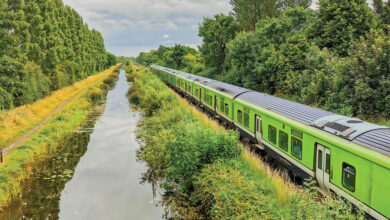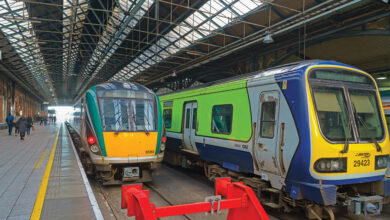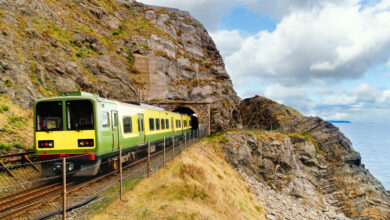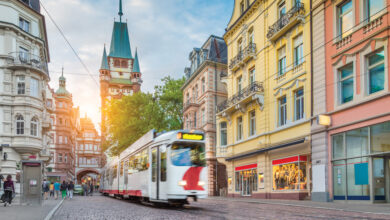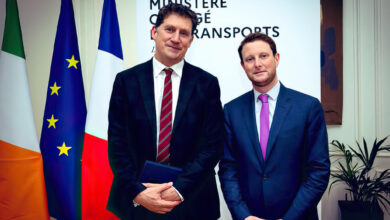Minister Eamon Ryan: ‘The key thing now is delivery’
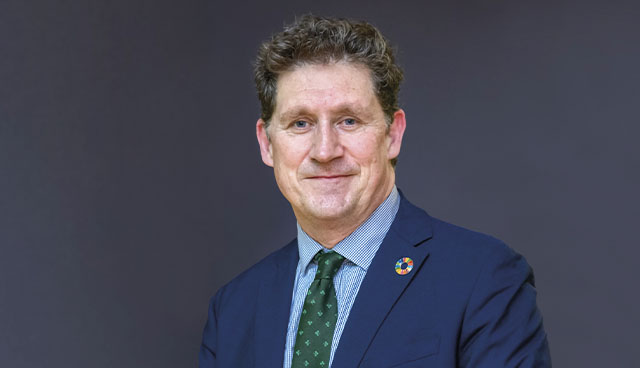
Minister for the Environment, Climate and Communications and Minister for Transport Eamon Ryan TD speaks to Odrán Waldron about the coalition government’s progress thus far, the ORESS auction to be held this year, and delivering a just transition.
Two years into the three-party coalition formed by Fianna Fáil, Fine Gael and the Green Party that he leads, Ryan feels that the Government is ideally placed to deliver on its promises over the three remaining years of its mandate. “My sense is that we have the right plans in place with Housing for All, the National Development Plan, and the Climate Action Plan and the key thing is now delivery,” he says. “The legislation backing up that plan is very strong so that will direct us, but it’s practical acceleration of key areas in sustainable mobility, heating and buildings, insulation, offshore winds, climate communications itself, land use and ensuring a just transition.”
Key to this delivery, Ryan says, will be the establishment of taskforces within both departments under his leadership that incorporate other departments and agencies. For example, for the development of offshore wind, the Department of the Environment, Climate and Communications will partner with the Department of Housing and Local Government, the Department of Enterprise, Trade and Employment, and agencies of the State such as the ports. With the 5GW by 2030 target key to the decarbonisation of the economy, the Green Party leader says that the process will be focused on ensuring delivery on time and getting environmental planning right. The same principles will apply to sustainable mobility, with the Department of Transport leading and bringing in agencies like the National Transport Authority (NTA) and Transport Infrastructure Ireland (TII), local authorities, and regional assemblies; these teams will investigate how to accelerate BusConnects in all five cities, and the new Connecting Ireland rural transport system.
“We need an all-island approach in our electricity system… the more interconnected we are north-south and east-west the better.”
As to whether the upcoming shuffle at the top of government, when Micheál Martin TD and Leo Varadkar TD will swap roles as Taoiseach and Tánaiste, will affect the Government’s progress, Ryan says: “I’m confident that all three parties in government have a common agreement that housing, healthcare reform, and climate action are our three priorities.
A major plank of global decarbonisation ambition is nascent planning to transition people from personal, fossil fuel-powered cars to electrified or green public transport but plans of this ilk have suffered setbacks of late in Ireland, with the NTA and TII now admitting that the MetroLink project will be delayed until 2035 at the earliest. Delays are a whole-of-government problem, Ryan reasons, not a specifically transport related one.
“Across a whole range of different areas of government, there’s a problem that it’s taking us so long to deliver projects we know we want to deliver through the permitting and contracting process,” he says.
Asked if the delays will have an affect on delivery against emissions and decarbonisation targets, Ryan emphasises that such a thought cannot be entertained: “I don’t think we can afford to miss them. In energy, we will meet them because this is the economic strategy for the State. There’s a huge ramping up of ambition on renewables and we have to make sure we have the shipping, cabling, turbines, ports and all infrastructure in place.
“How we change land use is more complex, but those changes will happen because we can move to a better system, and we see the exposure with very high fertiliser prices at the moment. We can’t be trading on an argent green brand if we’re not actually argent green in everything we do.”
Offshore wind
Delay has also blighted the rollout of major offshore wind projects in Ireland, delays that could scarcely be allowed due to the 2030 target of 5GW of offshore power, which is hoped to greatly aid the electrification and decarbonisation of various sectors. Having been delayed until 2022, the first offshore renewable electricity support scheme (ORESS) auction has been further delayed and is now set to take place in Q4 2022.
However, Ryan is not worried by the delay, explaining that much of it was due to the lag in progressing the Marine Area Planning Bill, which was finally enacted before year-end 2021. “By the end of this year or early next year, we will have MARA established as the body responsible for the maritime planning,” Ryan says.
“We have to reduce our dependency on imported fossil fuels; we have to meet our emissions targets; and we also have the economic opportunity, that renewable power will be the basis of our economic strategy in terms of how we power industry, in time how we export surplus power through interconnection with the rest of Europe to be part of regional rebalancing, and we can also look at ammonia and hydrogen as a way of storing that power.”
In recent times, threats to the grid have emerged in both the stress placed on it by increased consumption, largely blamed on increasing numbers of data centres in Ireland, and by a recent court challenge taken in the North in an attempt to separate EirGrid and SONI, but Ryan’s affirms the Government’s commitment to the integrated single market.
“We need an all-island approach in our electricity system and the transformation to a low-carbon society will see the electrification of so many different areas in transport and heating as well in industrial and commercial use, that the more interconnected we are north-south and east-west the better,” he says. “Discussing this with northern politicians over the years, I have always made the case that we have to have an all-island strategy, but we also have to work with the neighbouring island because the balancing of this renewable future requires that level of interconnection. We have to maintain this level of collaborative approach.
“The [carbon tax] increases that are due in May in oil and gas heating, each of them is about €1.40 a month net effect. The real increase is coming from our overdependence on imported fossil fuels and those fuels have become expensive on the international market.”
“I would say the same when it comes to data centres. We have to make sure that every sector helps us in this balancing act between variable supply and variable demand and data centres have a potentially beneficial role in that. For example, we’re working on a data centre in Tallaght, where the waste heat from the data centre heats local buildings. Similarly, we’ll need to locate data centres where it’s optimal for the grid so we can manage it without having to build out all the time and similarly, look for the backup generation that some of those centres have to add to our suite of resources to help us balance renewable energy when the wind isn’t blowing.
“The data centre companies understand this now; it can’t be a free for all or an open door for every project wherever people want. It does have to be managed by EirGrid particularly to optimise the network and that can happen. No sector gets an opt out on our climate targets, everybody has to contribute to what is a huge ask.”
Just transition
Such grid security will be key to the energy transition, the justness of which has been in question in public lately due to the scheduled annual rise of the carbon tax occurring at a time when oil and gas prices are at all-time highs. Ryan defends the mechanism as one that guarantees a just transition: “One of the advantages of the approach we’re taking is that one-third of additional revenues from the carbon tax go towards protecting those at risk of fuel poverty through social welfare increases.
“Around 55 per cent of it goes towards funding the retrofitting of buildings, which is socially progressive, looking at social housing and houses at risk of fuel poverty and giving them a 100 per cent grant. Then the remaining 15 per cent goes to typically small farmers to support environmental measures. The increases that are due in May in oil and gas heating, each of them is about €1.40 a month net effect. The real increase is coming from our overdependence on imported fossil fuels and those fuels have become expensive on the international market.”
Key to delivering a just transition will be collaboration, a topic to the fore of the first holding of the National Climate Stakeholder Forum, a consultative forum on climate issues led by Ryan’s department. “This is a huge transition we have to make, and we have shown in this country in the past when we’ve had to make changes that a partnership approach works,” Ryan says. “Social partnerships helped us get out of the economic crisis of the late eighties, social partnerships saw us through Covid where everyone rowed in and played their part. It will be the same with the climate transition.
“It was the first of such dialogues, we will be coming back in the summer and again later in the year. It was a very open process, we were focusing on some issues such as accelerating offshore renewables, sustainable renewables, retrofitting, and how we communicate all of this. I think that model of sharing with social partners, environmental NGOs, trade unions, youth councils, does work and so we’re going to double down on it and keep listening.”
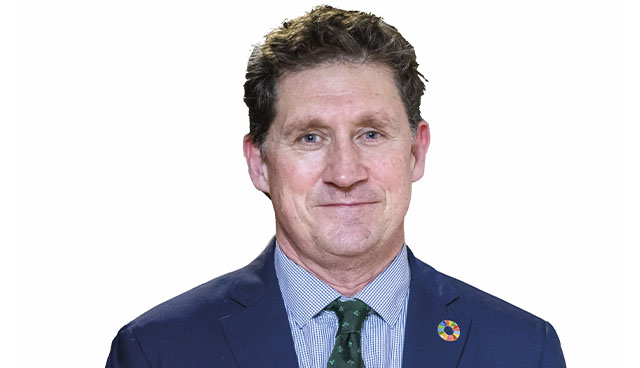
Opportunity
Crises, as the world has recently experienced with both Covid-19 and the Russian invasion of Ukraine, often present opportunities, and while Ryan admits that the world missed an opportunity due to inaction since climate science became an accepted fact in the late 1980s and early 90s, he is more optimistic that the opportunity of Covid has been grasped.
“When you see the third IPCC report, it can’t be ignored. We’re at such a critical moment where we do have to act at scale and at speed,” he says. “When you’re scaling up retrofitting it does take time, we have to get apprenticeships and workers in place, which we can. It takes time in sustainable mobility to start putting in the bus and cycle lanes that will be part of the solution, but we’re determined.
“Remote working is now a reality; two or three years ago you’d have said that would never happen. It has now and I don’t think we’ll be going back, certainly not to the way it was. We have a biodiversity and pollution crisis as well as an environmental crisis, and I think one of the things that happened during Covid is people did connect to their local environment. In those difficult times when we were restricted to 5km, people did start to appreciate their own local park, river, canal walk, environment.”
On a similar note, he concludes: “People underestimate, when we’ve got clear consensus around the need for change, the ability to do it. Covid is different to climate because it was an immediate pressing threat to everyone’s health; climate is a bigger, wider, longer threat that maybe isn’t every day for people, but our job is to inspire people to address this threat and show them it can be better for us. It won’t work if we just put the shame on people. That language and that framing of it is important as to how we see this challenge and I think Covid tells us in a variety of ways that we can make the leap.”

